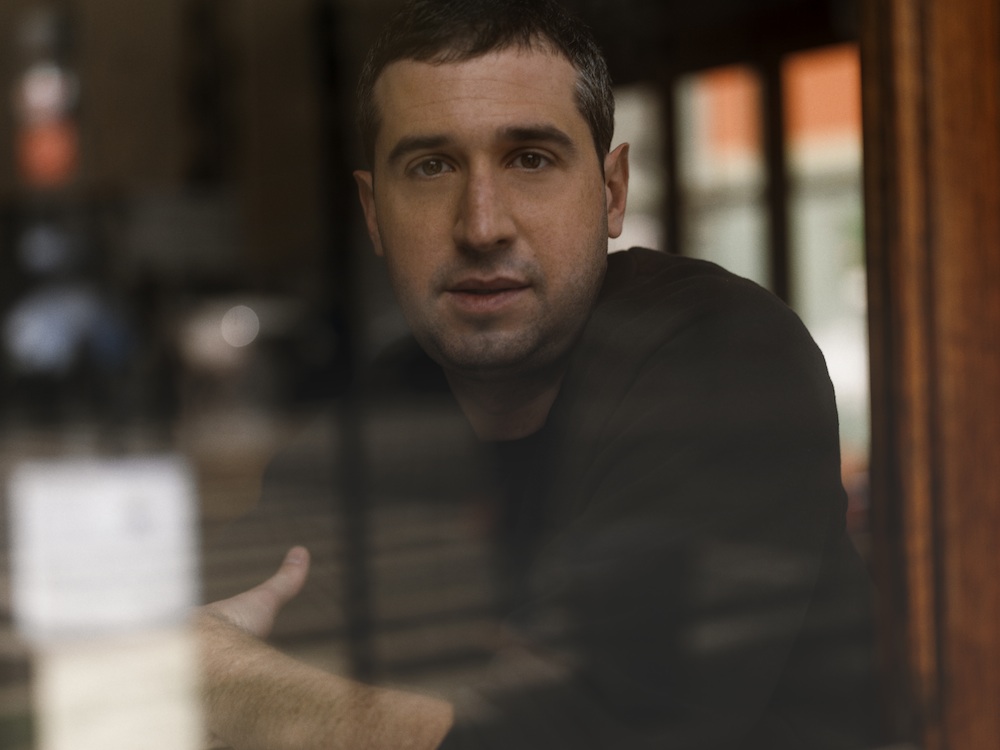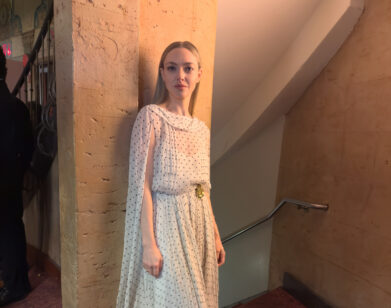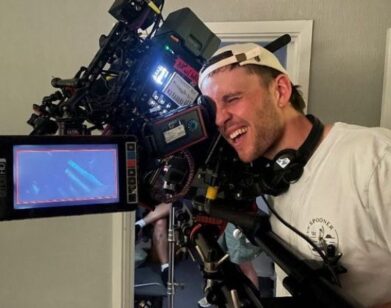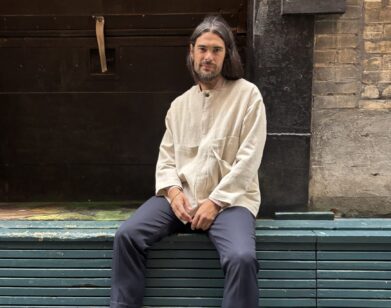Adam Leon

ADAM LEON AT TROQUET IN NEW YORK CITY, APRIL 2017. PHOTO: CHRISTOPHER GABELLO. GROOMING: PATRYCJA CICHON.
Tramps, the second feature film from Gimme the Loot writer-director Adam Leon, is a charming love story set over a few hazy summer days in New York. When Ellie (Grace Van Patten) and Danny (Callum Turner) are thrown together for a small-time heist, the two strangers have an instant connection. Whereas Ellie is sharp and worldly, Danny, an aspiring chef living with his Polish mother in Astoria, Queens, is earnest and completely smitten.
Last September Tramps premiered at the Toronto International Film Festival, and tomorrow it will begin streaming around the world via Netflix. We recently sat down with Leon, a native New Yorker who has previously worked at the Tribeca and New York Film Festivals, and the Jacob Burns Film Center in Westchester.
EMMA BROWN: When did you first become interested in directing?
ADAM LEON: I’ve wanted to do this since I was a kid. I actually didn’t tell anyone when I was growing up, because I really wanted it to be true; I didn’t want to be embarrassingly wrong. I wanted to hold on to that. I was working on my own stuff, but I really recommend working on film festivals. They’re incredibly helpful, because you see how the machine works. I was both at Tribeca and New York Film Festival. I was a director liaison, so I was taking the directors around, which was really fun, but also working with their team and seeing how people talk about movies and getting to know the people in the indie New York film industry. That was very, very helpful when I had a movie to go around. The idea for Gimme the Loot was organic, it wasn’t calculated, but when I had it, I was like, “Oh, this will work on the festival circuit.”
BROWN: What was your first job in film?
LEON: I was a PA for Woody Allen.
BROWN: That sounds terrifying.
LEON: No, no. It was amazing. I saw them make a movie. There are a lot of people who want to do this and then they get close to it and they realize it’s not for them. For me, it was just like, “Oh my god, this is even more for me than I thought it was.” I loved being around set. Then I was an intern in the editing room and that was unbelievable to watch them put together a movie.
BROWN: What made you decide on Gimme the Loot as a first feature?
LEON: Growing up, I always had ideas for movies and they would cost 30 million dollars and I would like them. I never found that lower-budget or mid-budget thing that could really work for a bigger audience. I co-directed a short movie [Killer, 2009] and used these kids from New York. I remember being in rehearsal and hanging out with these kids who had super vivid, complicated lives. But they were just teenagers; they weren’t that different from suburban teenagers or teenagers in Poland. And I remember thinking, “This is the movie I want to make. I want to make a movie about this rehearsal—hanging out with these kids and showing this world.” One of the kids who was in the short, Ty Hickson, was the lead in Loot. We went to the Nantucket Film Festival, it was the first time he was ever on a plane and it was this amazing weekend. I was like, “This guy can carry a movie. I think I can write for Ty, and this movie should be made super low budget.” I always felt like it would be worse if we’d had a million dollars to make it.
BROWN: Do you feel like a New York director? Or does it feel like a coincidence that both Tramps and Gimme the Loot are set in the City?
LEON: I feel it’s a coincidence. There is always a reason to not make a movie and that reason can be very good and that reason can be bad. I think the reason to not make Loot was that I was white, and ultimately I felt like that was a bad reason, because I wasn’t going to go into that situation blind. The reason to not make Tramps was that of all the ideas in the idea box, on the façade, it was the most similar [to Loot]. It’s a New York story; it takes place over a couple of days and involves a boy and a girl on an adventure. But I love the characters, and my agents were very encouraging. They said, “The way you’re talking about this story, you’re so excited. Your face is lighting up.” I decided to do it and I’m really happy I did, but there is a little defensiveness with me about it: “I can do these other things. You should see the other ideas. I was pursuing this script and it was totally different; I was pursuing writing that script and it was totally different.” It’s a coincidence, but I’m proud of them and they do feel like they work together in a certain way.
BROWN: Which character came first, Ellie or Danny? The Polish community Danny lives in in Astoria is very specific, how did that come about?
LEON: We actually talked to Polish people—Astoria is hugely multiethnic, so why would a Polish family live in Astoria? The story developed from a lot of different strands: the hook of it—one brother replacing another brother on a heist—came from this lunch I had with my brother in Peru. Ellie was part of another script that I had been writing, it was a male role that changed. But really they clicked in together at the same time—within, like, 20 minutes of thinking about this idea in this way—and I got really excited about them. Very, very quickly—and this is, for me, is always the great sign—I could hear them. I knew what they were going to say or do in any situation I found myself in, how they would react differently. They became my imaginary friends. It was super fun to live in that world.
BROWN: Does being able to hear the character voices while writing make the casting process more difficult?
LEON: No, because if you love a character, you have to set it free. Things are going to change with the project, so how do you make them change for the better? Actors are going to come in and inform the character in a way that maybe you didn’t envision or have a different physical description that makes things more interesting. It’s being open to that. There’s this Mike Nichols line that I’m obsessed with that’s really about production, but I think it’s true for the whole process: “You take the script and you beat it up and you beat it up. You get it to where you think it’s as good as it possibly can be and then you go shoot the movie and immediately it starts to tell you what it is.” I think that’s true in casting, too. You really need to know these characters inside and out, and if an actor comes in and is able to embody that, but also challenge that and able to interpret that in a different way, it can open up elements in the story that you didn’t see. It’s an opportunity to make things better. The script goes through another rewriting phase when the actors get cast. I remember telling Grace, “I don’t need to know what Ellie is always thinking—you do. And she always needs to be thinking.” I find that very exciting. I love giving those characters to the actors.
BROWN: Do you miss them?
LEON: Do I miss Ellie and Danny? I don’t know. I think we did it. For whatever the movie is, and it’s not perfect, I do think we realized Ellie and Danny in a way that I’m really proud of. So no, I don’t now walk around with them as my imaginary friends. I have new imaginary friends from my next project.
BROWN: You mentioned your brother, is he older or younger?
LEON: My brother is younger. He’s in college. I’m the one who would call him from jail and be like, “You have to do something terrible for me.” It’s insulting, people would read the Tramps script before we cast Callum, who’s a beautiful man, and say, “Is Danny based on you?” And I’d be like, “No! How could a director be like Danny? Are you kidding? I’m Jimmy. I’m the guy who is running the operation. Danny is living under the thumb of his family.” Then once we cast this beautiful man, everyone stopped asking me if it was based off of me. Ty [Hickson] showed up on set one day and he said, “This is what Adam thinks he looks like.”
BROWN: Gimme the Loot did really well, but once that died down, was it a let down? Did you experience a moment of panic about what you were going to do next?
LEON: It wasn’t panic; it was just such a long process. It’s a unique thing to have your first movie tour the world. A lot of people told me, “Enjoy this. Take the time to have fun with it.” And we really did. I was working throughout that process—I was writing—but I was able to really do this long tour. It premiered in March of 2012 and we were at the Gotham Awards in December of 2013, so it was almost two years. We showed up at SXSW and there were 18 people sleeping on the floor and two months later we had agents and international sales reps and distributors and we were at Cannes in tuxedos. Those two months were fucking crazy. Things moved slower than I had hoped afterwards: I wrote a script and I hit a wall, and I wrote a script and I hit a wall, and then I pursued a project and I didn’t get it. Then I pursued a project and I did, and they had lied about the rights. And that happens. It’s hard not to be precious and not to feel this ton of pressure when you’re making a second movie because you are trading in a card. I feel so much freer now after doing two. It’s easier for me to put “director” on my customs forms.
BROWN: Getting into TIFF with Tramps must have been a pretty good moment.
LEON: The night before we premiered in Toronto, it was an emotional night. I was thinking a lot about the things that had happened in the years in between the movies, and some of those things were really great and some of those things weren’t. I wanted to watch an episode of Cheers—I’m obsessed with Cheers—but I was in Canada, so I was on iTunes and I needed to set up a new account and it frustrating—”Can I just watch Cheers? I’m so stressed!” Setting up the iTunes account they asked security questions and one of the security questions is “What’s your dream job?” And I started to cry. That was a sort of beautiful moment. Cheers and Apple security questions led me to happiness, fulfillment.
TRAMPS COMES OUT TOMORROW, APRIL 21, 2017, VIA NETFLIX.






